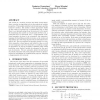29 search results - page 1 / 6 » Inductive trace properties for computational security |
JCS
2010
13 years 3 months ago
2010
Protocol authentication properties are generally trace-based, meaning that authentication holds for the protocol if authentication holds for individual traces (runs of the protoco...
ENTCS
2007
13 years 4 months ago
2007
The tracer Hat records in a detailed trace the computation of a program written in the lazy functional language Haskell. The trace can then be viewed in various ways to support pr...
CADE
2004
Springer
14 years 4 months ago
2004
Springer
Abstract. Automated tools for finding attacks on flawed security protocols often struggle to deal with protocols for group key agreement. Systems designed for fixed 2 or 3 party pr...
TLCA
2009
Springer
13 years 11 months ago
2009
Springer
Abstract. Programming languages theory is full of problems that reduce to proving the consistency of a logic, such as the normalization of typed lambda-calculi, the decidability of...
CCS
2001
ACM
13 years 9 months ago
2001
ACM
The events of a security protocol and their causal dependency can play an important role in the analysis of security properties. This insight underlies both strand spaces and the ...

